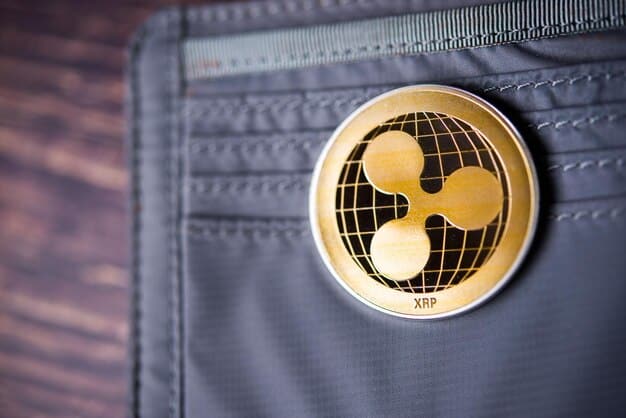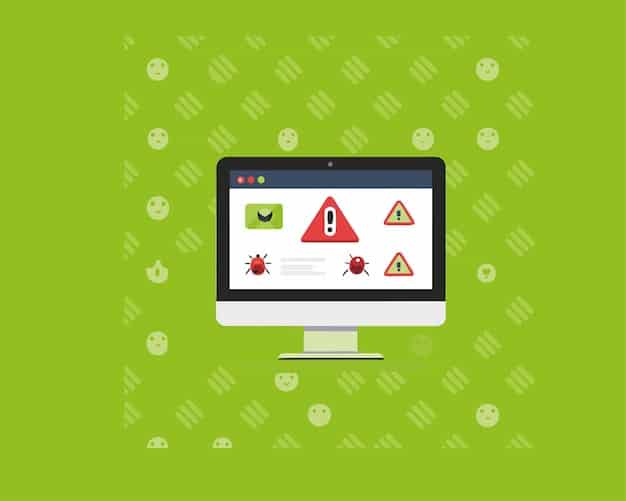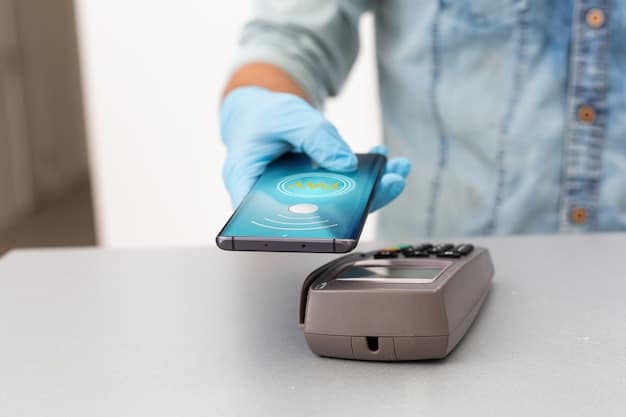Altcoin Wallet Security: Protecting Your Crypto from Hacks and Scams

Altcoin wallet security is crucial for safeguarding your digital assets against hacks and scams; employing best practices like using hardware wallets, enabling two-factor authentication, and staying informed about the latest security threats can significantly protect your investments.
In the rapidly evolving world of cryptocurrency, securing your digital assets is paramount. With the increasing popularity of altcoins, understanding and implementing robust altcoin wallet security measures is essential to protect your investments from potential hacks and scams.
Understanding the Risks: Common Altcoin Wallet Security Threats
The world of altcoins, while promising, is rife with potential security risks. Understanding these threats is the first step in creating a secure environment for your investments. From phishing attacks to malware, numerous dangers lurk, waiting to exploit vulnerabilities in your defenses.
Phishing Attacks: A Deceptive Threat
Phishing attacks remain a prevalent threat in the crypto space. Cybercriminals often impersonate legitimate services or individuals to trick users into revealing their private keys or seed phrases.
- Beware of Suspicious Emails: Always scrutinize emails claiming to be from your wallet provider or exchange. Look for inconsistencies in the sender’s address and grammar.
- Verify Website URLs: Ensure that the website you are visiting is the official domain. Phishing sites often use URLs that are very similar to the real ones.
- Never Share Private Keys: A legitimate service will never ask for your private key or seed phrase. Keep this information offline and secure.
Malware and Keyloggers: Silent Intruders
Malware and keyloggers can silently infiltrate your computer, jeopardizing your wallet security. These malicious programs can record your keystrokes or steal sensitive data from your device.

Regularly scanning your system with a reputable antivirus program is essential to detect and remove any malicious software. Be cautious when downloading files or clicking on links from unknown sources.
In conclusion, understanding the common threats such as phishing and malware is vital for securing your altcoin wallets. Implementing proactive measures can significantly reduce your risk of falling victim to these scams.
Choosing the Right Altcoin Wallet: Security Features to Consider
Selecting the right altcoin wallet is a critical step in ensuring the safety of your digital assets. Not all wallets are created equal; some offer advanced security features that can greatly enhance your protection. Consider the following aspects when choosing an altcoin wallet.
Hardware Wallets: The Gold Standard
Hardware wallets are often considered the most secure option for storing altcoins. These physical devices store your private keys offline, making them virtually impervious to online threats.
- Offline Storage: Hardware wallets keep your private keys offline, reducing the risk of remote attacks.
- PIN Protection: Users can set a PIN to prevent unauthorized access to the device.
- Seed Phrase Backup: A seed phrase allows you to recover your wallet in case the device is lost or damaged.
Software Wallets: Convenience with Caution
Software wallets, available as desktop or mobile apps, offer convenience but require more vigilance. They store your private keys on your device, making them more vulnerable to malware and hacking attempts.
When using software wallets, always keep your operating system and antivirus software up to date. Enable two-factor authentication (2FA) where available to add an extra layer of security.

Ultimately, choosing the right altcoin wallet depends on your security needs and risk tolerance. Hardware wallets are generally more secure, while software wallets offer greater convenience.
Implementing Two-Factor Authentication (2FA) for Enhanced Security
Two-factor authentication (2FA) adds an extra layer of security to your altcoin wallets by requiring a second verification method in addition to your password. This significantly reduces the risk of unauthorized access, even if your password is compromised.
How 2FA Works
2FA typically involves linking your wallet to an authentication app on your smartphone or using a hardware security key. When you log in, you’ll need to enter a code generated by the app or key, in addition to your password.
Enabling 2FA is a simple yet effective way to protect your altcoin wallets from hacking attempts. Most reputable wallet providers and exchanges offer 2FA as a standard security feature.
In summary, implementing 2FA can dramatically enhance the security of your altcoin wallets, providing an additional layer of protection against unauthorized access.
Securing Your Seed Phrase: Best Practices for Backup and Storage
Your seed phrase, also known as a recovery phrase, is the master key to your altcoin wallet. It is essential to secure your seed phrase properly to prevent loss or theft of your digital assets.
Writing Down Your Seed Phrase
The most common method of securing your seed phrase is to write it down on a piece of paper. Ensure that you transcribe the phrase accurately and store it in a secure location.
- Use Tamper-Evident Envelopes: Store the paper in a tamper-evident envelope to detect any unauthorized access.
- Consider Metal Storage: For long-term storage, consider engraving your seed phrase onto a metal plate, which is more resistant to fire and water damage.
Avoiding Digital Storage
Storing your seed phrase digitally, such as in a text file or note-taking app, is highly discouraged. Digital storage makes your seed phrase vulnerable to hacking and malware attacks.
Securing your seed phrase is a critical aspect of altcoin wallet security. Following these best practices can help protect your digital assets from loss or theft.
Staying Informed: Keeping Up with the Latest Security Threats and Updates
The cryptocurrency landscape is constantly evolving, with new security threats emerging regularly. Staying informed about the latest vulnerabilities and security updates is crucial for protecting your altcoin wallets.
Following Security News and Alerts
Keep an eye on security news outlets, cryptocurrency blogs, and social media channels to stay informed about the latest threats and vulnerabilities.
By staying vigilant and informed, you can proactively protect your altcoin wallets from emerging security threats.
In conclusion, staying informed enables you to take proactive steps to protect your altcoin wallets and adapt your security measures accordingly.
Regular Audits and Privacy Practices: Maintaining Long-Term Security
Maintaining long-term altcoin wallet security involves regular audits of your security practices and a focus on privacy. These steps ensure that your assets remain protected over time.
Performing Regular Security Audits
Conduct regular security audits to identify and address any vulnerabilities in your system. This includes reviewing your wallet settings, updating your software, and monitoring your account activity.
Performing regular security audits, adopting strong privacy practices, and keeping your wallet software up to date are essential for sustaining robust altcoin wallet security over the long term.
| Key Point | Brief Description |
|---|---|
| 🛡️ Hardware Wallets | Offline storage, PIN protection, and seed phrase backup enhance security. |
| 🔑 Secure Seed Phrase | Store offline on paper or metal, avoid digital storage. |
| ✔️ Implement 2FA | Adds an extra layer of security, requiring a second verification method. |
| 🚨 Stay Informed | Keep up with the latest security threats and updates. |
Frequently Asked Questions
▼
An altcoin wallet is a digital tool used to store, manage, and transact altcoins. Security is crucial because these wallets hold cryptographic keys that control access to your funds; if these keys are compromised, your altcoins can be stolen.
▼
Hackers use various methods, including phishing attacks, malware, keyloggers, and social engineering. These tactics aim to trick users into revealing their private keys or seed phrases, allowing unauthorized access to their wallets.
▼
2FA adds an extra layer of security by requiring a second verification method, such as a code from an authentication app, in addition to your password. This makes it significantly harder for hackers to access your wallet.
▼
Storing your seed phrase offline protects it from online threats like hacking and malware. Digital storage makes your seed phrase vulnerable, whereas offline storage keeps it safe from remote attacks.
▼
Stay informed by following security news outlets, cryptocurrency blogs, and social media channels. These sources provide timely updates on emerging threats and security best practices, helping you stay proactive.
Conclusion
Protecting your altcoin investments requires a comprehensive approach to wallet security. By understanding the risks, choosing the right wallet, implementing 2FA, securing your seed phrase, and staying informed, you can significantly reduce your vulnerability to hacks and scams. Taking these steps will help ensure the long-term security of your digital assets.





